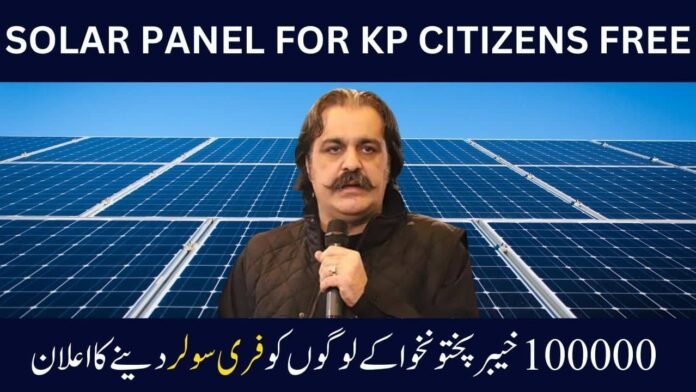Ali Amin Gandapur, the Pakhtunkhwa CM, has announced a groundbreaking scheme. This initiative will provide 100,000 impoverished households with free solar systems, each with a 2 kW capacity. This significant step will not only enhance energy accessibility. But also alleviate the financial burden of power expenses for the province’s most vulnerable families.
Solar System Initiative Particulars
In his announcement, Ali Amin Gandapur explained what each solar system would consist of. Every system will include solar panels, wiring, and an inverter that converts DC into AC. So it can be utilized by appliances running on alternating current (AC); fans, which are needed during hot weather when there is no electricity because they provide comfort through air movement; and bulbs, which give light when it’s dark outside due to the absence of an electric supply.
This installation seeks to combat problems like electricity thefts and line losses rampant in this area for many years. These devices will be fixed.
The Ehsaas Programme will distribute these solar systems to eligible poor households. Notably, this initiative in Khyber Pakhtunkhwa stands out from the one in Punjab, where only solar panels were provided. In contrast, the KP scheme offers a complete package, including all necessary components. Gandapur underscored this distinction during his speech by emphasizing the comprehensive nature of the KP initiative.
Cash Allocations And Project Scope
According to him, the government has set aside over twenty billion rupees to finance this venture alone. KP recognizes the importance of ensuring that people below the poverty line are not left behind. The province is focused on providing access to current energy forms, like electricity, which they cannot afford at prevailing market rates. This challenge is a local issue and a nationwide concern, as financial resources are limited nationally and locally. Despite the high poverty rates recorded among these communities, there is an urgent need to address this now more than ever before.
Through such schemes as this one, local authorities hope that the central government will solve part of their income problem. They also want to reduce dependency on the national grid and promote sustainable energy utilization measures while at it since they believe in the “thinking globally acting locally” philosophy, which calls for taking action within their jurisdiction first before extending outwards. Thus, it contributes to achieving global goals set under the SDG framework. Especially those related to poverty eradication, environment protection, affordable cleaning, etc.


